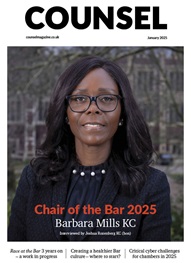*/
Family
The President of the Family Division of the High Court has renewed his call for greater transparency in the family courts, after rejecting a local authority’s application for a reporting restriction order.
In a case that raised questions about the public “right to know” and how courts should adapt to the realities of social media, Sir James Munby refused to “gag” a father so that “what from the local authority’s perspective are his unpalatable views are less likely to see the light of day”.
In Re J (A Child), Staffordshire County Council applied for an injunction against a father whose child had been removed by Social Services against his will. The father had posted material about the social workers involved on the internet, including names, photographs and footage of the moment when the child was taken away.
Sir James refused to grant an injunction “because of the manner or style in which the material is being presented on the internet, nor to spare the blushes of those being attacked, however abusive and unjustified those attacks may be.”
The only justification would be to protect J’s privacy and anonymity, said Sir James, but the risk of that happening through the naming of the local authority or social workers was “fanciful”.
Sir James, who became President of the Family Division in January, issued draft practice guidance in July on the publication of judgments in family courts and the Court of Protection. He clarified that in this case, “the arguments in favour of publicity – in favour of openness, public scrutiny and public accountability – are particularly compelling.”
Also tasked with reducing delays, he is bringing in reforms that create a single family court, new rules restricting expert evidence and a 26-week time limit for care proceedings. “The current delays are scandalous and unacceptable,” said Sir James in an interview for Counsel (see p 14). “These are things that are going to happen,” and family justice professionals must “get on board and understand that,” he stated.
In a case that raised questions about the public “right to know” and how courts should adapt to the realities of social media, Sir James Munby refused to “gag” a father so that “what from the local authority’s perspective are his unpalatable views are less likely to see the light of day”.
In Re J (A Child), Staffordshire County Council applied for an injunction against a father whose child had been removed by Social Services against his will. The father had posted material about the social workers involved on the internet, including names, photographs and footage of the moment when the child was taken away.
Sir James refused to grant an injunction “because of the manner or style in which the material is being presented on the internet, nor to spare the blushes of those being attacked, however abusive and unjustified those attacks may be.”
The only justification would be to protect J’s privacy and anonymity, said Sir James, but the risk of that happening through the naming of the local authority or social workers was “fanciful”.
Sir James, who became President of the Family Division in January, issued draft practice guidance in July on the publication of judgments in family courts and the Court of Protection. He clarified that in this case, “the arguments in favour of publicity – in favour of openness, public scrutiny and public accountability – are particularly compelling.”
Also tasked with reducing delays, he is bringing in reforms that create a single family court, new rules restricting expert evidence and a 26-week time limit for care proceedings. “The current delays are scandalous and unacceptable,” said Sir James in an interview for Counsel (see p 14). “These are things that are going to happen,” and family justice professionals must “get on board and understand that,” he stated.
Family
The President of the Family Division of the High Court has renewed his call for greater transparency in the family courts, after rejecting a local authority’s application for a reporting restriction order.


Barbara Mills KC, the new Chair of the Bar, outlines some key themes and priorities
Rachel Davenport, Co-founder and Director at AlphaBiolabs, discusses the role that drug, alcohol and DNA testing can play in non-court dispute resolution (NCDR)
Casey Randall explores what makes AlphaBiolabs the industry leader for court-admissible DNA testing
By Louise Crush of Westgate Wealth Management
A family lawyer has won a £500 donation for her preferred charity, an education centre for women from disadvantaged backgrounds, thanks to drug, alcohol and DNA testing laboratory AlphaBiolabs’ Giving Back campaign
Louise Crush of Westgate Wealth Management highlights some of the ways you can cut your IHT bill
What's it like being a legal trainee at the Crown Prosecution Service? Amy describes what drew her to the role, the skills required and a typical day in the life
Barbara Mills KC wants to raise the profile of the family Bar. She also wants to improve wellbeing and enhance equality, diversity and inclusion in the profession. She talks to Joshua Rozenberg KC (hon) about her plans for the year ahead
Are Birmingham’s Intensive Supervision Courts successfully turning women offenders’ lives around? Chloe Ashley talks to District Judge Michelle Smith
Professor Dominic Regan and Seán Jones KC identify good value bottles across the price spectrum – from festive fizz to reliable reds
Governments who play fast and loose with the law get into real trouble, says the new Attorney General. The Rt Hon Lord Hermer KC talks to Anthony Inglese CB about what drew this boy from Cardiff to the Bar, bringing the barrister ethos to the front bench, and how he will be measuring success